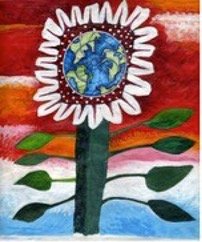Rwanda Healing Project Celebrates 20 years!
Part I – Transformation of Rugerero Genocide Survivors Village
2024 marks the 20th anniversary of Barefoot Artists’ Rwanda Healing Project. Since the project’s beginning in 2004 we have helped transform Rugerero Survivors’ Village from grief and poverty into a thriving community. Through art, rainwater harvesting, sanitation, husbandry, and skill-building, we’ve helped 100 families heal and rebuild. Art and creativity sparked a powerful shift, turning pain into hope and despair into vitality.
Professor Sally Thompson visited the village in January 2024 and collected testimonials from residents regarding the impact of the project. Professor Thompson wrote, “Oh, Lily, I am deeply moved by getting to visit with the many people whose lives you helped change. So many testimonials of your work.” A couple of these testimonials are provided below.
“Initially Mama Lily & Barefoot Artists team rehabilitated our houses which were on the verge of being destroyed; she changed our life story. We were exposed to bad weather with all the risks of illness and above all the risk of our lives in the event of destruction. Now we sleep peacefully without fear!!
Let’s add that she gave us rainwater collection tanks.”
Majyambere Celestin, a member of their association called “Tuzamurane” which means together let us develop.
“My name is Uwamahoro Jacqueline; I am also from the Tuzamurane association: Water helps us keep our bodies, our clothes, the dishes clean and especially in our toilets. Thanks to help from BA team and volunteers from Engineers without Borders, before we lived without toilets, with a lot of diarrheal diseases, but now each family has its own toilet!!”
In 2009 Barefoot Artists established a micro-lending program, a revolving credit fund for the community which has facilitated the development of small businesses. The income earned through these ventures helps to pay their children's school fees and health insurance.
Transformation of 14 Twa Villages in Rubavu District
In 2007, Barefoot Artists began working with the Twa, an invisible and oppressed indigenous community, to help lift them from the depths of poverty to a life of dignity and self-sustainability.
This year, we celebrate transforming all the 14 Twa villages situated across the land of Rubavu District.
Our approach has included a combination of artistic and agricultural initiatives: promoting pottery art, constructing an art center, introducing sustainable goat farming, and developing innovative agricultural programs. These efforts have significantly improved the quality of life in these communities, offering new avenues for income, empowerment, and cultural expression.
Collective Farming
Villagers from each of the 14 communities cultivate land together, typically growing maize, potatoes, beans, and eggplants.
A Flourishing Vegetable Garden
Hundreds of tiered vegetable gardens have been installed in recent years, with one garden for each family in the 14 Twa villages. Additional gardens were built last month to support migrant Twa from the north, who were drawn to the area's food production and more stable living conditions.
Recycling Tires for Vegetable Gardens
Used tires are being recycled to create sustainable vegetable gardens in the community.
Habyara Jean Damascene,
Habyara, a Kanama Twa, now an assistant to Bosco Musana, prepares the Tetero villagers to start maize and potato farming, as well as vegetable planting.
The villages we’ve worked with include Rugerero, Kanama, Bazirete, Mudende-Tetero, Mudende-Kanyundo, Nkomane, Busigari, Cyanzarwe, Kabirizi, Nkama, Mudende-Rukeri, Mudende-Murambi, Busasamana, and Bugeshi. The last two villages, marked on the map, are now practicing collective farming, planting individual family vegetable gardens, and cultivating fruit-bearing trees. These changes represent the beginning of a new chapter for the Twa — a life transformed from generations of poverty to one of self-reliance and dignity.
These efforts have been stewarded on the ground by Jean Bosco Musana, a Rwandan humanitarian working with the Red Cross. We are extremely grateful for this partnership of 20 years that has led to profound transformation, both for the participants and ourselves.
"Reflecting on the history of the Twa, a community once resigned to inferiority and neglect, I am deeply moved by the journey we’ve taken together. I remember the attitudes of contempt and disregard we, the society, held for the Twa in the past, and I felt a personal responsibility to help change this narrative. Working with Barefoot Artists for the last two decades has been a deeply rewarding experience. Today, I am proud to say that we’ve helped the Twa communities move from devastation to self-sufficiency and dignity. The first village we helped, Rugerero, has since achieved national and international recognition for its pottery and performing arts — a symbol of the creativity and resilience of the Twa people."
– Jean Bosco Musana









